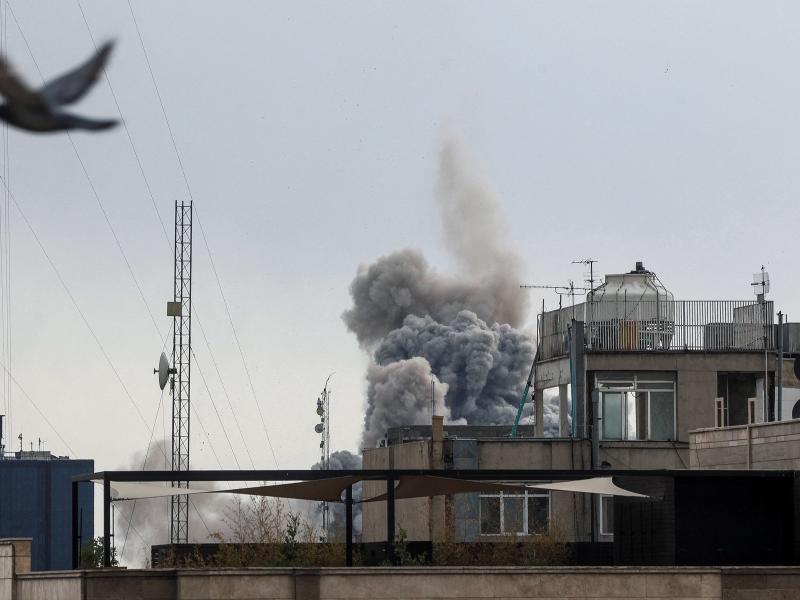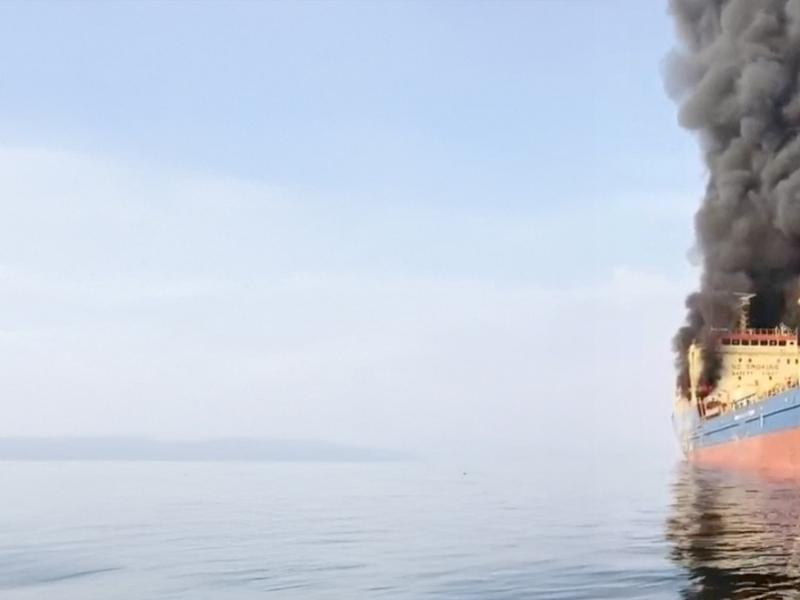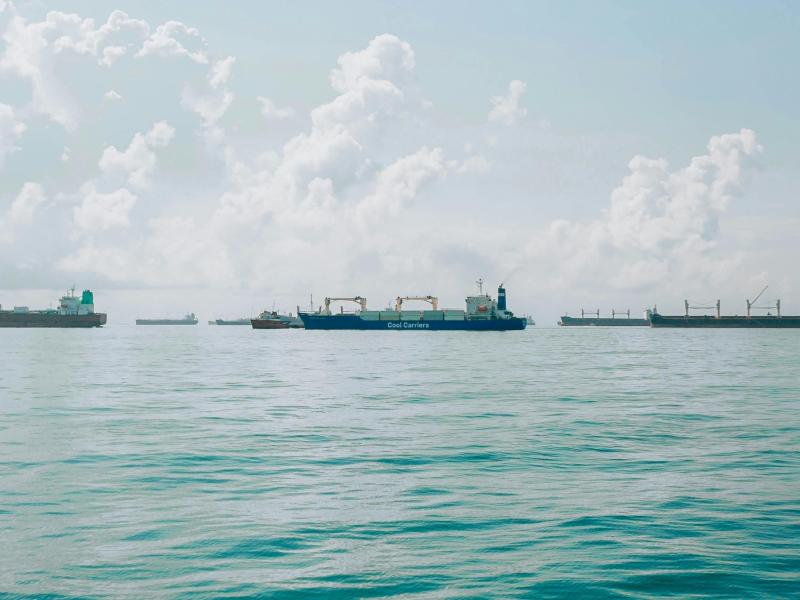ITF delegates were at this year’s COP27 conference, putting the voices of our affiliates and transport workers around the world at the heart of discussions on our planet’s future.
- We highlighted the unequal regional impacts of climate change, and the need for global attention to the devastation being caused across Africa - looking across urban transport, road and rail, aviation, tourism, shipping and fisheries.
- We marked one year of the Maritime Just Transition Task Force and brought the voice of seafarers to Egypt
- On inland transport, we took part in vital discussions on the future of rail and urban transport, including the launch of key initiatives on low carbon urban transport
- On aviation, we launched a ground-breaking new Sustainable Aviation policy
- We represented women and young workers within the conference, highlighting the disproportionate challenges climate changes poses to these workers.
- As part of a wider trade union and civil society movement, we co-ordinated with our partners and friends to strengthen all our voices
- Throughout the high-level negotiations, the ITF delegates prioritised the vital issue of climate finance
Transport workers made their presence felt at COP27, the UN’s annual climate summit, held in Egypt’s Sharm El Sheikh in November 2022. And the transport workers’ presence was more important than ever before.
As the climate crisis wreaks ever more damage around the world, transport workers are among the most exposed to harm. At the same time, climate action is bringing changes to every transport sector, and these will have big impacts in the workplace.
Transport workers must have a voice as decisions are made which affect their lives, their livelihoods and conditions, their futures. And that’s what the ITF delegation was there to do at COP27.
 Credit: Abdul Majeed Goraya/IRIN | www.irinnews.org. Transport workers have been working through the floods in Pakistan, where a third of the country was submerged. The Railway Workers’ Union has called out the devastating impacts of unprecedented flooding on train operations and workers.
Credit: Abdul Majeed Goraya/IRIN | www.irinnews.org. Transport workers have been working through the floods in Pakistan, where a third of the country was submerged. The Railway Workers’ Union has called out the devastating impacts of unprecedented flooding on train operations and workers. Credit: Matt Palmer/Unsplash. Scientists have warned that global warming increase the risks of further bushfires in Australia by 30%, endangering the lives of transport workers and worsening working conditions.
Credit: Matt Palmer/Unsplash. Scientists have warned that global warming increase the risks of further bushfires in Australia by 30%, endangering the lives of transport workers and worsening working conditions.  Credit: YODA Adaman/Unsplash. Fishermen leave canoes on a dry lake in Burkina Faso, awaiting the return of the waters. Fisheries is intertwined with climate change, and as harms escalate, so do the devastating impacts on the livelihoods of fishers.
Credit: YODA Adaman/Unsplash. Fishermen leave canoes on a dry lake in Burkina Faso, awaiting the return of the waters. Fisheries is intertwined with climate change, and as harms escalate, so do the devastating impacts on the livelihoods of fishers.  Credit: Office of the Presidency of South Africa. South Africa declared a national emergency in April, as record rains caused flooding and landslides, killing hundreds of people and devastating the critical Port of Durban and major roads and railways, with serious ramifications for transport workers and supply chains.
Credit: Office of the Presidency of South Africa. South Africa declared a national emergency in April, as record rains caused flooding and landslides, killing hundreds of people and devastating the critical Port of Durban and major roads and railways, with serious ramifications for transport workers and supply chains.At COP27, we campaigned for climate justice and worker justice to go hand in hand. We intervened in the negotiations, spoke at major panels, met with governments, international bodies, and employers, joined demonstrations and actions, and built relationships with other trade unions and the wider social and environmental movement.
COP27 saw some important steps forward. The agreement to provide ‘loss and damage’ funding for countries hit hard by climate disasters was an important breakthrough. And the creation of a work programme on just transition, with specific recognition of the need for social dialogue and social protection.
We also won high level support for our just transition demands in the transport sector. The Egyptian Presidency’s key transport initiative at COP27 addressed a long-standing gap on public transport, and crucially, included a commitment to strong labour standards and a just transition for informal transport workers. The launch of the Maritime Just Transition Task Force action plan for a just transition for seafarers secured high level support from international bodies and a number of governments, including the Philippines and the US. We also forcefully set out the case for a just transition for workers in the rail and aviation sectors.
The fact that we brought transport workers to COP made our case especially strong. Our transport worker delegates, all women and young workers, brought the experience of the workplace directly to key decision makers, which was a big change in this arena - and a vital one.
At the same time, there were challenges. The failure to agree emissions cuts on the scale the world needs is a big concern. Workers issues were marginalised in many key negotiations, including climate finance. This reinforces the need for us to build on the platform we’ve created, and to keep pushing transport worker voices to the fore as we move forward.
As we look to 2023, it is more important than ever before that workers’ issues are at the heart of climate action. Workers are essential to effective action on climate. This starts with making sure that workers are protected from the harm being caused by climate change, and it continues with good working conditions and good union jobs, this is what we need so that workers can play their part.
We must keep up the fight for climate justice and worker justice.
Stephen CottonITF General Secretary
 Credit: Sami Dellah-TUAC/UFCW(FTQ). The ITF delegation joined protests at COP27. We joined with the wider movement to call for action on loss and damage – a remedy for the irreversible harms that climate change has already caused.
Credit: Sami Dellah-TUAC/UFCW(FTQ). The ITF delegation joined protests at COP27. We joined with the wider movement to call for action on loss and damage – a remedy for the irreversible harms that climate change has already caused.
ITF COP27 delegation – who was there?
- Stephen Cotton, ITF General Secretary
- John Mark Mwanika, ITF Urban Transport Chair, Amalgamated Transport and General Workers’ Union (ATGWU -Uganda)
- David Gobé, ITF Railways Section Chair, CGT Railway Workers’ Federation
- Jas Giri, ITF Young Transport Workers’ Representative, Rail and Maritime Transport Union, New Zealand
- Lindsey Austin, Seafarer, Seafarers International Union, USA
- Cleo Bierneza, Seafarer, AMOSUP, the Philippines
- Sari Sairanen, Unifor, Canada
- Sticks Nkambule, SWATCAWU, Swaziland
- Bilal Malkawi, ITF Arab World Regional Secretary
- Samar Youssif Safan, ITF Arab World Regional Educator
- Jeremy Anderson, ITF Sustainable Transport Lead
- Juman Kubba, ITF Strategic Researcher
Bringing a regional perspective to COP27, looking at climate action across transport sectors
Dubbed the African COP, the Sharm El Sheikh climate summit was a chance to draw global attention to climate devastation across the continent, call out broken promises and push for action.
We produced our own report on the role of sustainable transport in driving Africa’s energy and economic transition for COP27. This set out the action needed in urban transport, road and rail, aviation, tourism, shipping and fisheries to cut transport emissions and limit further climate change, achieve climate resilient transport systems and working conditions fit for Africa’s new climate realities, put in place industry plans based on a worker-led just transition, and ensure financing is available at the scale and in the form needed for climate action on transport in Africa.
Crucially, we were able to draw on work the ITF and affiliates have been carrying out across the continent, bringing in transport worker insights, experiences and proposals. This meant that we could speak to realities on the ground and bring worker perspectives to issues such as the approach to informal transport, the action needed on occupational health and safety and the opportunities for good, green transport jobs as Africa moves forward.
 The ITF has been working with affiliates and partners in countries including Côte d’Ivoire, Senegal and Uganda on worker-led formalisation of the informal transport sector which dominates Africa’s cities so as to reduce emissions, improve road safety and bolster wages and conditions for transport workers.
The ITF has been working with affiliates and partners in countries including Côte d’Ivoire, Senegal and Uganda on worker-led formalisation of the informal transport sector which dominates Africa’s cities so as to reduce emissions, improve road safety and bolster wages and conditions for transport workers.
 In Cairo, the capital of the COP27 host country, transport workers have been sharing their experiences of worsening climate harms, feeding into research into the changes needed to protect occupational health and safety in the face of worsening weather shifts and extreme weather events.
In Cairo, the capital of the COP27 host country, transport workers have been sharing their experiences of worsening climate harms, feeding into research into the changes needed to protect occupational health and safety in the face of worsening weather shifts and extreme weather events.
 Our Jobs, Our Planet, Our Public Transport rally in Nairobi, Kenya. This is part of the work we’ve been doing to raise attention to the need for a just transition for transport workers.
Our Jobs, Our Planet, Our Public Transport rally in Nairobi, Kenya. This is part of the work we’ve been doing to raise attention to the need for a just transition for transport workers.
 The ITF’s work with affiliates on sustainable transport in Africa has highlighted the particular needs of women transport workers who tend to hold jobs which are less secure and more exposed to weather hazards and extremes.
The ITF’s work with affiliates on sustainable transport in Africa has highlighted the particular needs of women transport workers who tend to hold jobs which are less secure and more exposed to weather hazards and extremes.
 Credit: Tembinkosi Sikupela/Unsplash. ITF and C40 modelling in five global cities, including Johannesburg, shows how investing in public transport in line with climate mitigation goals would create 650,000 new good-quality jobs in these cities alone, and another 650,000 more jobs globally.
Credit: Tembinkosi Sikupela/Unsplash. ITF and C40 modelling in five global cities, including Johannesburg, shows how investing in public transport in line with climate mitigation goals would create 650,000 new good-quality jobs in these cities alone, and another 650,000 more jobs globally.
 In the run up to COP27, unions in Cairo gathered to look at the issue of just transition and began to engage with government representatives on planned transport initiatives.
In the run up to COP27, unions in Cairo gathered to look at the issue of just transition and began to engage with government representatives on planned transport initiatives.
The ITF launched the Africa report at COP27, bringing transport worker perspectives into the climate summit.
 Speaking at the ITUC’s high-level panel on just transition, Steve Cotton called for climate action to tackle the harms Africa is facing, emphasising the need for worker dialogue to achieve change that ‘benefits all and protects against harms’.
Speaking at the ITUC’s high-level panel on just transition, Steve Cotton called for climate action to tackle the harms Africa is facing, emphasising the need for worker dialogue to achieve change that ‘benefits all and protects against harms’.There was no ‘Transport Day’ at COP27, but there were several key events in the official programme focusing on transport. One of the highest profile events was the Marrakech Partnership Global Climate Action Event on Transport.
John Mark Mwanika represented transport workers on this panel, setting out the major actions needed in maritime, inland transport and aviation to tackle climate change and achieve a just transition for Africa’s transport workers in particular.
“Resilience for workers is a huge gap in transport policy. Supporting resilience for workers is about many things: it’s about equipment and infrastructure, it’s about the approach to services, it’s abouts health and safety and social protections, it’s about training.”
He presented Angie Farag-Thibault, the Road Sector Transport lead in the High-Level Champions Team with copies of the ITF’s latest reports on Sustainable Transport for Africa, maritime, and aviation.
 At the Marrakech Partnership Global Climate Action Event, John Mark Mwanika highlighted findings from ITF sustainable transport reports, and set out the action needed across transport sectors to achieve a just transition for workers in Africa and globally.
At the Marrakech Partnership Global Climate Action Event, John Mark Mwanika highlighted findings from ITF sustainable transport reports, and set out the action needed across transport sectors to achieve a just transition for workers in Africa and globally.
A just transition for seafarers: The Maritime Just Transition Task Force one year on
Delivering a just transition for seafarers was a big topic at COP27.
Working seafarers came to COP for the first time, bringing their perspective from working on board in front of the industry’s key decision makers, including senior executives from shipowners and governments.
Following AP Moller Maersk Vice President Morten Bo Christensen, Lindsey Austin, Chief Officer and SIU member spoke about the importance of making sure that seafarers voices were listened to. ‘I understand social dialogue as unions and employers getting around the table to iron out the key issues, that is what we need to do to make our industry green’
 Credit: Sami Dellah-TUAC/UFCW(FTQ).
Credit: Sami Dellah-TUAC/UFCW(FTQ). Lindsey spoke alongside Cleo Biernaza, a third officer and Amosup member from the Philippines. The event was not only the first time that working seafarers spoke at a COP event, but it was also the first all women panel for a seafarer's event.
Lindsey spoke alongside Cleo Biernaza, a third officer and Amosup member from the Philippines. The event was not only the first time that working seafarers spoke at a COP event, but it was also the first all women panel for a seafarer's event. Nigel Topping, the outgoing high level climate champion (who is responsible for driving industry level decarbonisation plans on behalf of the COP Presidency), recognised the importance of Lindsey and Cleo’s attendance at COP27. ‘We should no longer talk about shipping without having seafarers in the room’.
Nigel Topping, the outgoing high level climate champion (who is responsible for driving industry level decarbonisation plans on behalf of the COP Presidency), recognised the importance of Lindsey and Cleo’s attendance at COP27. ‘We should no longer talk about shipping without having seafarers in the room’.Lindsey and Cleo were in demand to speak at a number of events during COP.
 Cleo gave an interview to the COP TV channel, where she called on all governments and employers involved in the shipping industry, to ‘keep in mind the workers who are often forgotten, make them the core of your plans, make sure you invest in the workers’
Cleo gave an interview to the COP TV channel, where she called on all governments and employers involved in the shipping industry, to ‘keep in mind the workers who are often forgotten, make them the core of your plans, make sure you invest in the workers’The strong seafarers voice at COP27 translated into high level backing for a just transition.
At the launch of the Maritime Just Transition Task Force 10-point action plan, ‘Mapping a Maritime Just Transition for Seafarers’, leaders of the of ITF, ICS, UN Global Compact, IMO, ILO and Philippines Environment Secretary Maria Loyzaga gave their backing for the plan.
 At the launch of the Maritime Just Transition Task Force 10-point action plan. From left: Jeremy Anderson, ITF. Eric Oechslin, Director Decent Work Team, ILO. Hon. Maria Yulo-Loyzaga, Secretary of Environment and Natural Resources, Philippines. Sanda Ojiambo, CEO, UN Global Compact. Martha Selwyn, UN Global Compact. Kitack Lim, Secretary General, IMO. Guy Platten, Secretary General, ICS. Stephen Cotton, General Secretary, ITF. Helio Vicente, ICS.
At the launch of the Maritime Just Transition Task Force 10-point action plan. From left: Jeremy Anderson, ITF. Eric Oechslin, Director Decent Work Team, ILO. Hon. Maria Yulo-Loyzaga, Secretary of Environment and Natural Resources, Philippines. Sanda Ojiambo, CEO, UN Global Compact. Martha Selwyn, UN Global Compact. Kitack Lim, Secretary General, IMO. Guy Platten, Secretary General, ICS. Stephen Cotton, General Secretary, ITF. Helio Vicente, ICS.
The Task Force is the first global body on just transition to be established at industry level, and the action plan also received strong support from the US government. Sue Biniaz, the Deputy Special Climate Envoy for the US Government, also spoke at the launch of the Task Force action plan, and later declared that the US would call for a just transition for the workforce to be included in the IMO’s revised Greenhouse Gas Strategy, which will set emissions targets for the shipping industry.

Maritime outcomes and next steps
- Maritime Just Transition Task Force launches report ‘Insights into seafarer training and skills needed for a decarbonised shipping industry’ conducted by DNV, and the 10 point action plan ‘Mapping a maritime just transition seafarers’ authored by the Task Force secretariats
- Governments, including the Philippines and US, support the 10 point action plan at the launch event.
- US Government calls for a just transition for the workforce to be included in the Revised GHG strategy
- Looking towards COP28, we need to continue the focus on maritime
Making progress with governments and employers on inland transport
The ITF delegation went into COP27 with a range of materials setting out the challenges workers face in inland transport. Our reports included in-depth analysis of just transition issues for urban public transport workers, analysis of national climate action plans around the world, as well demands for the People’s Public Transport Policy and the Safe and Sustainable Rail campign. We had also engaged with multi-stakeholder groups such as the Sustainable Mobility for All consortium which launched a report incorporating our demands on urban transport at the summit.
To promote our asks, the ITF delegation joined panels and held meetings with employer groups, government and international stakeholders.
 The ITF delegation met with inland transport employer groups, governments and international bodies to discuss industrial and regional worker issues, making progress which we will continue to build on as we move into 2023. Here, John Mark Mwanika, Bilal Malkawi, Samar Safan, David Gobé and Jas Giri meet with the International Association of Public Transport (UITP).
The ITF delegation met with inland transport employer groups, governments and international bodies to discuss industrial and regional worker issues, making progress which we will continue to build on as we move into 2023. Here, John Mark Mwanika, Bilal Malkawi, Samar Safan, David Gobé and Jas Giri meet with the International Association of Public Transport (UITP).  David Gobé speaking at an event co-organised by Quebec province and the Scottish Government on the benefits of a just transition in transportation, setting out lessons learned from worker experiences in urban transport and rail.
David Gobé speaking at an event co-organised by Quebec province and the Scottish Government on the benefits of a just transition in transportation, setting out lessons learned from worker experiences in urban transport and rail. We did not forget the wider worker struggle while at COP27. Here David Gobé and Jas Giri send a solidarity message to striking truckers in Korea and calling for safe rates.
We did not forget the wider worker struggle while at COP27. Here David Gobé and Jas Giri send a solidarity message to striking truckers in Korea and calling for safe rates.  Sticks Nkambule and Jeremy Anderson at the ILO just transition pavilion, where the ITF delegation and other trade unions consistently raised workers issues throughout COP27.
Sticks Nkambule and Jeremy Anderson at the ILO just transition pavilion, where the ITF delegation and other trade unions consistently raised workers issues throughout COP27.
The COP27 presidency included urban transport within its ‘Solutions Day’ at the end of the conference. ITF engaged in preparatory sessions for this event with employer groups, financing bodies and other transport actors, pushing for key demands, including the expansion of public transport, and a just transition for workers, including informal transport workers, to be incorporated. On Solutions Day, the Egyptian presidency launched the Low Carbon Transport for Urban Sustainablility (LOTUS) initiative, setting out a vision which took account of our worker demands. We will look at how we can build on this as we move forward.
COP27 outcomes on inland transport
- COP27 Presidency launches Low Carbon Transport for Urban Sustainability (LOTUS) initiative, recognising the need for systemic change, strong labour standards, an expansion of public transport and a global agenda for a just transition including strong labour standards, including for informal transport workers. A complementary initiative, Sustainable Urban Resilience for the Next Generation (SURGE) was also launched, recognising the need for an inclusive approach to climate action in cities, including with regard to transport.
- Positive meetings and joint panels with employer groups, governments and international organisations on rail and urban transport, setting the foundation for future dialogue.
- The Sustainable Mobility for All Partnership, a coalition which brings the ITF together with ITF with governments, international financial institutions and other global bodies, produced a "joint report on priority areas for action on public transport, which incorporates ITF positions on climate ambition, just transition of transport workers and protections against climate change harms with investment in adaptation and resilience.
 In the final days of COP27, the Egyptian presidency announced the LOTUS initiative which incorporated key ITF demands on just transition for urban transport workers.
In the final days of COP27, the Egyptian presidency announced the LOTUS initiative which incorporated key ITF demands on just transition for urban transport workers.
Launching the Sustainable Aviation Policy at COP27
COP27 happened at an important moment for aviation. In September ICAO, the UN body that regulates global aviation and also international aviation emissions, agreed that aviation should reach net zero emissions by 2050.
Speaking on a panel debating what a just transition to net zero for aviation should look like, Jeremy Anderson made sure the critical role of workers was on the agenda. ‘Aviation workers are the missing piece in this discussion. Aviation workers are acting on climate change, 9 million aviation workers are the industry’s everyday problem solvers, and governments and industry need to listen’
‘We are launching our Sustainable Aviation policy today, and we are calling for a Just Transition Task Force that will set out a workforce plan for decarbonisation’


 At the Marrakech Partnership panel, John Mark reiterated the call for a global employment study to identify the skills that aviation workers will need to decarbonise. “We know that aviation is one of the most difficult sectors to decarbonise, and this can only happen with a highly skilled workforce. We need the global jobs plan, and to start training the workforce now.”
At the Marrakech Partnership panel, John Mark reiterated the call for a global employment study to identify the skills that aviation workers will need to decarbonise. “We know that aviation is one of the most difficult sectors to decarbonise, and this can only happen with a highly skilled workforce. We need the global jobs plan, and to start training the workforce now.”
Aviation outcomes and next steps
- ITF launches Sustainable Aviation policy ‘A zero carbon future for the aviation sector’
- COP28 will be held under the Presidency of the UAE, which is a major player in the global aviation industry through its ownership of the Emirates and Etihad airlines. For COP28, its time for the COP to engage in aviation and a just transition for aviation workers much more seriously.
Bringing young and women workers to COP27
Bringing the voice of young transport workers was a major focus for the ITF at COP27. Although the voice of youth is well established in the COP system, the voice of young workers has been almost entirely absent. The ITF young sustainable transport workers group is mobilising to bring the workers issues into youth policy at COP.
Jas Giri was the first youth representative on the ground in Sharm El-Sheikh. Jas attended the Conference on Youth (COY), which took place the week before COP.
‘I was the only trade union representative at COY, this needs to change. There are over a billion young workers, we will be affected by climate change, we need our say’.

At COP itself, youth are represented through YOUNGO (Youth NGOs). Until now, YOUNGO have had no trade union representatives involved. Speaking on a panel organised by YOUNGO and ILO, Jas made it clear that workers issues need a much stronger presence.
 Jas speaking at the Intergenerational dialogues on a Youth-Friendly Just Transition, hosted by YOUNGO and the ILO, Children and Youth Pavilion
Jas speaking at the Intergenerational dialogues on a Youth-Friendly Just Transition, hosted by YOUNGO and the ILO, Children and Youth Pavilion The ITF delegation also brought the young workers perspective to transport events. Jas and Cleo spoke about the challenges they face as, respectively, a young rail worker and a young woman worker in shipping.
 Cleo Biernaza reading a ‘story from the future’ at the Resilience Hub event ‘Creating a consolidated global proposition for a safer maritime system’
Cleo Biernaza reading a ‘story from the future’ at the Resilience Hub event ‘Creating a consolidated global proposition for a safer maritime system’ Jas speaking at the ILO Capacity Building Hub: How can we green skills for a just transition?
Jas speaking at the ILO Capacity Building Hub: How can we green skills for a just transition?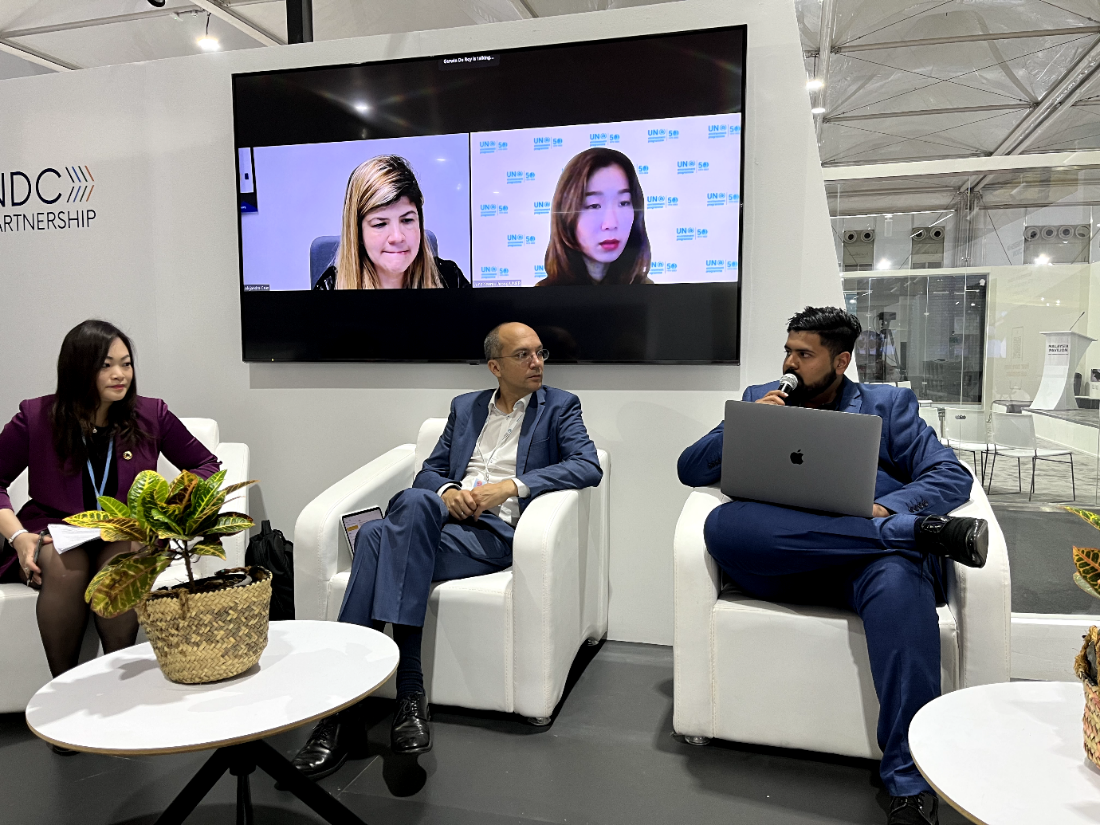 Jas speaking at the UNESCAP panel Accelerating Just Transition to Low Carbon Transport in Asia and the Pacific, NDC Pavilion (actually shouting to make himself heard in the noisiest room in COP)
Jas speaking at the UNESCAP panel Accelerating Just Transition to Low Carbon Transport in Asia and the Pacific, NDC Pavilion (actually shouting to make himself heard in the noisiest room in COP) The power is in the network: Activists from the ITF young workers network log on from a briefing from Jas, Juman and Jeremy - live from the COP lunch area
The power is in the network: Activists from the ITF young workers network log on from a briefing from Jas, Juman and Jeremy - live from the COP lunch areaCOP27 underlined to us the need for more women worker voices to feed into climate action discussions, negotiations and outcomes. We were happy to have strong women speakers within the ITF delegation, and this is an area we will look to build further going into 2023.
 It was great to have Lindsey and Cleo in our delegation, speaking to their experiences as working women seafarers.
It was great to have Lindsey and Cleo in our delegation, speaking to their experiences as working women seafarers.  Samar was also heavily involved in COP27, engaged in a series of panels in the Civil Society Pavilion.
Samar was also heavily involved in COP27, engaged in a series of panels in the Civil Society Pavilion. The world in the hands of our young workers!
The world in the hands of our young workers!
The wider trade union and civil society movement for climate action
Throughout COP27, we worked closely with the wider trade union group. The ITUC organised daily coordinating sessions, and we were able to share information and coordinate our work to maximise our collective impact.
 Our COP days started with a meeting of the trade union group, sharing information, identifying opportunities and coordinating our efforts.
Our COP days started with a meeting of the trade union group, sharing information, identifying opportunities and coordinating our efforts. We were also able to connect with other groups and movements, and joined demonstrations amping up pressure on governments to take strong action on key climate issues.
 Giving an interview to young activists, keen to hear and share a worker perspective on COP27.
Giving an interview to young activists, keen to hear and share a worker perspective on COP27. Waving the flag for loss and damage: The ITF shows its support loss and damage demands, which was the most important demand for Global South countries at COP27.
Waving the flag for loss and damage: The ITF shows its support loss and damage demands, which was the most important demand for Global South countries at COP27.
 Credit: Sami Dellah-TUAC/UFCW(FTQ).
Credit: Sami Dellah-TUAC/UFCW(FTQ).
High level negotiations at COP27: The voice of transport workers
Working with the wider trade union group, we followed negotiations throughout COP27. We helped to coordinate worker demands for the final COP27 text and promoted these through interventions on behalf of the trade union group, side meetings and discussions.
Ahead of COP27, the ITF decided to prioritise climate finance in the formal negotiations. The issue of how sustainable and resilient transport infrastructure and services are funded will be one of the most important issues in the coming decade. There are many issues at stake, will there be enough funding available? Will there be proper public funding that does not place additional debt burdens on countries in the Global South? And will workers have a say in how climate finance is delivered?
Workers issues have been absent from climate finance discussions so far, this is something we need to change.
 Speaking on behalf of the trade union group at a high-level ministerial dialogue on climate finance, Juman Kubba highlighted the price workers are paying for the climate crisis: “Workers are losing heir lives and livelihoods. More and more are being forced to migrate. Workers are dealing with irreversible damage to their working conditions, their physical and mental health, their safety, their community. This is exacerbated by the lack of social protection – for many there is no healthcare, no unemploymet protection, no safety net when these climate harms hit.”
Speaking on behalf of the trade union group at a high-level ministerial dialogue on climate finance, Juman Kubba highlighted the price workers are paying for the climate crisis: “Workers are losing heir lives and livelihoods. More and more are being forced to migrate. Workers are dealing with irreversible damage to their working conditions, their physical and mental health, their safety, their community. This is exacerbated by the lack of social protection – for many there is no healthcare, no unemploymet protection, no safety net when these climate harms hit.”
Behind the scenes
The COP27 venue was a maze. Finding the correct meeting room, plenary room, pavilion, and government office was a daily struggle. One area that was important to find was the government delegations area. Far away from the flashy pavilions, this was the place to get access to key negotiators.
 Jas and Jeremy were regular to the Aotearoa New Zealand government offices.
Jas and Jeremy were regular to the Aotearoa New Zealand government offices.
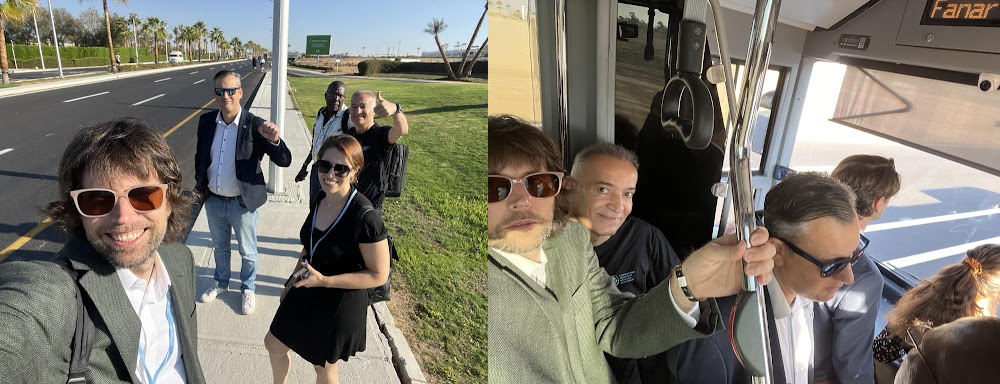 Buses were the lifeblood of COP27 as hotels in Sharm El Sheikh were spread out over a large area. But we needed more of them. It was hard to get on a bus, and there was very little space once you were on.
Buses were the lifeblood of COP27 as hotels in Sharm El Sheikh were spread out over a large area. But we needed more of them. It was hard to get on a bus, and there was very little space once you were on.COP27 went into overtime as negotiators wrangled over the final text. We tracked the talks, looked at any ways we could push for a positive outcome, and as information trickled through, we worked on our response.
 The last Saturday night at COP, preparing the trade union statement to COP27 and the final ITF press release.
The last Saturday night at COP, preparing the trade union statement to COP27 and the final ITF press release.
 3.45am. The closing plenary of COP27 is about to start, where we will learn the key outcomes of the conference
3.45am. The closing plenary of COP27 is about to start, where we will learn the key outcomes of the conference
 5.12am. The final decisions of COP27 have now been announced, Jeremy completes the last edits on the ITF response ‘Breakthrough on loss and damage, attempts to sideline labour standards’
5.12am. The final decisions of COP27 have now been announced, Jeremy completes the last edits on the ITF response ‘Breakthrough on loss and damage, attempts to sideline labour standards’
 7.32am The closing plenary is still going! Is it safe to have another nap before Juman is called to give the trade unions statement?
7.32am The closing plenary is still going! Is it safe to have another nap before Juman is called to give the trade unions statement?
 9.15am: The last speakers at COP27. Juman and Sacha Dierckx of ABBV, Belgium give the final statement of the trade union group (TUNGO), after which COP27 officially closes.
9.15am: The last speakers at COP27. Juman and Sacha Dierckx of ABBV, Belgium give the final statement of the trade union group (TUNGO), after which COP27 officially closes.
COP27 is over, what happens next?
As the COP27 outcomes were confirmed, emotions were mixed.
On the positive side, there was jubilation from many civil society groups over the decision to establish a loss and damage fund. Although big questions about the fund remain - including how much money will be available and crucially, for us, what it will mean for transport workers - the decision was seen as a breakthrough after 30 years of demands by developing countries bearing the burden of the climate crisis.
There were also key commitments to just transition that we need to follow up on. The final COP27 decision, officially called the Sharm El Sheikh Implementation Plan, established a work programme on just transition for the first time, and also an annual high-level ministerial round table. There were also explicit references to social dialogue and social protection, which were important the direct result of campaigning by the trade unions group. Finally, a just transition forum in relation to climate finance will take place in 2023.
At the same time, there were serious setbacks on climate ambition. COP27 did not deliver a strong commitment to reducing emissions in line with the 1.5-degree target, or an agreement to phase out fossil fuels. If anything, the power of the fossil fuel lobby increased at COP27, with over 600 fossil fuel lobbyists in attendance.
And despite the wins on just transition, too often workers issues were being pushed to the side in the negotiations. For example, up until now, workers issues have simply not been on the agenda in the climate finance negotiations. We need to push back and put workers at the heart of negotiations on the economic and energy transformation. As we said in the closing statement:
“The world has been through transitions before. And for workers, transition is too often a dirty word - a word that means job losses, poor working conditions, exploitation, being left behind. We must learn from the past. And this is exactly why a just transition of the workforce as explicitly stated in the Paris Agreement is essential. … A just transition of the workforce must be embedded in every workstream: mitigation, adaptation, loss and damage and climate finance.”

A final thank you
We can’t finish without a few thank yous!
Firstly, to the ITF Arab World office for your hospitality and support during our time in Sharm El Sheikh.
A big thanks to those who joined the ITF delegation for your time, energy and endless patience.
And finally, to all our colleagues and partners who have worked tirelessly to support the sustainable transport work throughout the year and the delegation through COP, thank you!
 Credit: Sami Dellah-TUAC/UFCW(FTQ). Home time at COP27.
Credit: Sami Dellah-TUAC/UFCW(FTQ). Home time at COP27.

